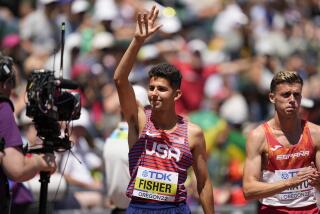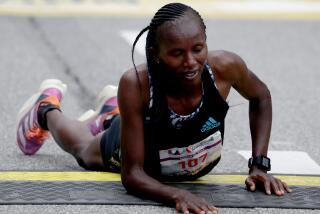Runners Beat Clock to Try to Beat Heat
ATLANTA — If the organizers of these Olympic Games are very lucky--and they’ve been short in that department thus far--the weather for the men’s marathon today will be cool and dry. Unseasonable, in other words.
Everything has been done here--short of moving the event to a cooler city--to accommodate the athletes who have to run 26 miles 385 yards through steamy streets. The race is being run at 7 a.m. EDT, with the hope the early-morning cloud cover will stave off the day’s heat.
Temperature will be a factor, but a greater one will be humidity, which will sap the runners. To combat dehydration, water stations have been placed every mile and a half along the course.
Anticipating the worst, seven medical vans staffed with multilingual personnel will follow the runners.
The expected conditions favor runners who run well in heat and also suggest a tactical race. For that reason, Martin Fiz of Spain is the favorite. Fiz is the reigning world champion, and he has shown he can win under difficult conditions. Four months ago, he set a personal best of 2 hours 8 minutes 25 seconds.
The weather will also benefit Dionicio Ceron of Mexico, second to Fiz at the World Championships. Ceron has a best time of 2:08:30 and claims he is capable of running 2:05:30, which would shatter the world record. Antonio Pinto of Portugal has trained in conditions to mimic Atlanta’s. He was second in this year’s Tokyo Marathon and has run 2:08:38 this year.
The race begins and ends in the Centennial Olympic Stadium.
(BEGIN TEXT OF INFOBOX / INFOGRAPHIC)
The Marathon’s Toll
It is the longest race in Olympic competition, a 26.2-mile grind that extracts a physical and mental price from runners.
Body Temperature
Fluid loss from sweating decreases blood volume. Heart works harder to move remaining blood, and body temperature rises. Depending on amount of dehydration, temperature reading may reach more than 100 degrees.
Muscle ache
Carbohydrates, the runner’s “fuel,” deplete after about 1 1/2 to two hours. Body then begins to use greater amount of fat as fuel source, and muscle pain occurs.
Thigh
Legs also get sore because quadriceps muscles act as a brake with each footfall. The pain is caused by little tears in the muscles.
Brain
As carbohydrate stores deplete, the mind wanders and runners may lose concentration; the brain can’t burn fat the way muscles can. After the race, there may be some mild depression from letdown.
Heart
With elite runners, rate increases to about 75% to 85% of maximum. (Average runners are more likely to be in the 60% to 75% range.)
Lungs
Ventilation rate, or how much air moves in and out of lungs, is about five to six liters per minute while at rest; for a marathon it’s about 60 to 80 liters per minute.
Source: Human Performance Laboratory, Ball State University
Researched by TOM REINKEN, Los Angeles Times
More to Read
Go beyond the scoreboard
Get the latest on L.A.'s teams in the daily Sports Report newsletter.
You may occasionally receive promotional content from the Los Angeles Times.







